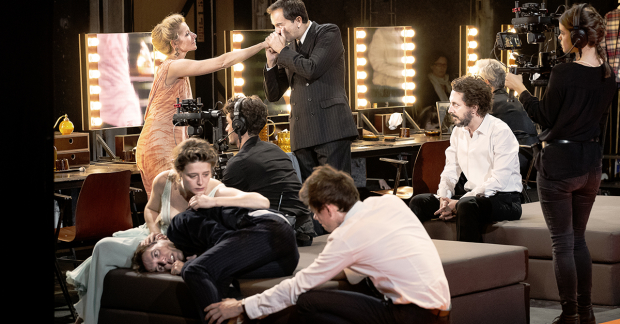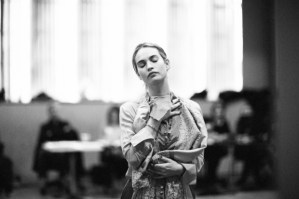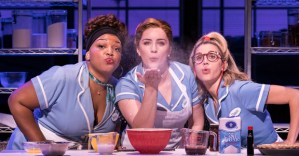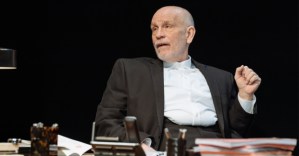Review: The Damned (Barbican Theatre)
Ivo van Hove’s production for Comédie-Française opens at the Barbican

Adeline d'Hermy in Les Damnes
© Jan Verswevyeld
The director Ivo van Hove likes the act of transposing film to stage – and he does it a lot. After Network, Obsession and All About Eve, to name but three, he has now taken Visconti's The Damned, about the destruction of a powerful German industrial family by the rise of the Nazis and its own inner demons and turned it into a production for the magnificent Comédie-Française.
He has dressed up this dark and compelling story with what are becoming increasingly familiar tricks: dressing tables and mirrors at the side of the stage, women in skimpy evening wear and a lot of onstage nudity, a huge screen showing the actors and the action in close-up. These tropes are sometimes effective: in Network, for example, there is a point to the idea that screens are used for public and private intrusion. The same was true in van Hove's devastating productions based on Shakespeare's Histories and Roman plays.
But here it often feels distracting. A kind of indulgence creeps into the entire concept, which undermines the bleak, spare message about the corrupting effects of power and the damaging effects of accommodation. The tricks also, unforgivably, sometimes blur the storytelling, so that anyone without a good working knowledge of Visconti's fable about the fate of the Essenbeck family might miss crucial plot points.
The whole thing, for all its cleverness, feels heavy-handed and laboured. There are, of course, things to admire: the way that Tal Yarden's video mixes historical footage with the onstage action; Eric Sleichim's ear-splitting, grating, frightening score. It is undoubtedly chilling that each death is followed by the actor walking into his or her own coffin, lined up on one side of the stage, and that their agonised face inside the narrow box haunts the next stage of the action. It is also impossible to miss the complicity of the way the cast line up to face the audience, before the killing begins again. The scene where the Brown Shirts are massacred, in a mixture of lengthy onstage carousing and a pre-recorded film that owes a great deal to Bosch, is stunning.
But as the evening wore on – it plays at more than two hours unbroken – I found I was getting irritated. Instead of watching a long close up of strewn silverware, or the ridiculous sight of the Lady Macbeth like Sophie van Essenbeck running through the Barbican foyers searching for her predatory son, I wanted to be allowed to concentrate on the acting. Because some of it, particularly from Loïc Corbery and Guillaume Gallienne is very fine indeed.
As for van Hove, I long for him to stop adapting films and go back to directing plays. His productions of Shakespeare, Ibsen and Miller have been revelatory; I don't understand why he is ransacking the classic movie catalogue with ever diminishing returns. After the disappointments of Obsession and All About Eve, I had hoped this would be a return to form; it didn't work for me.



















